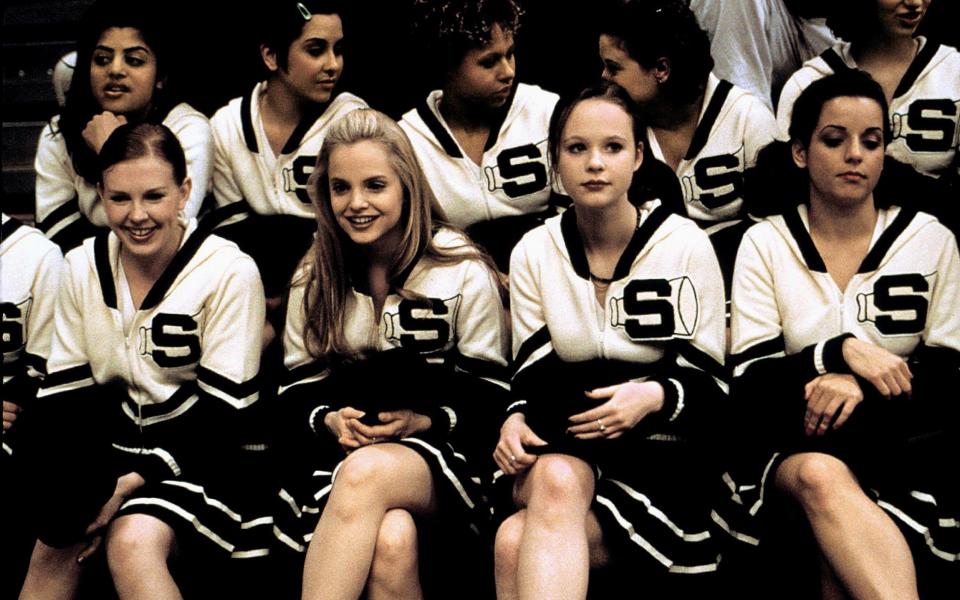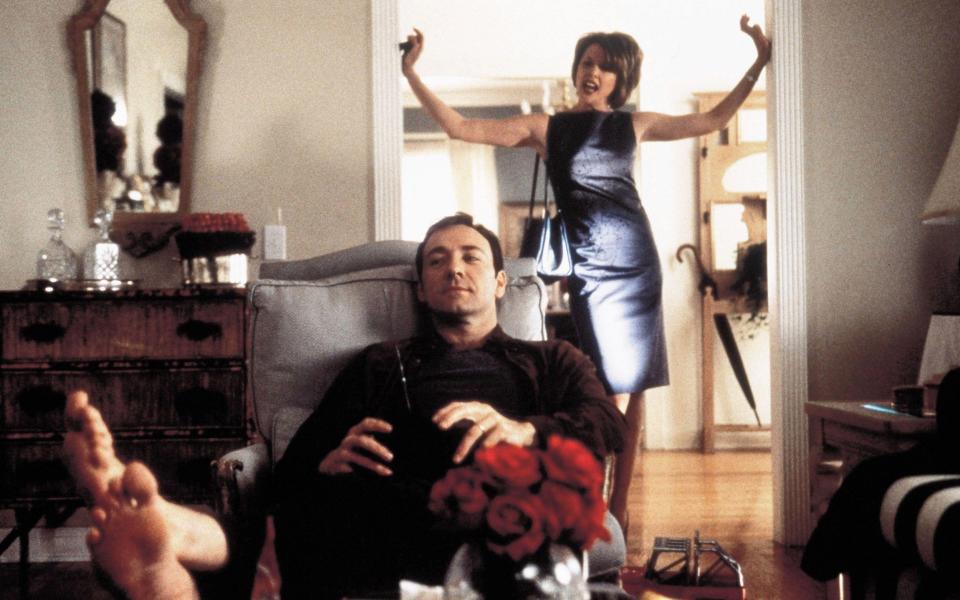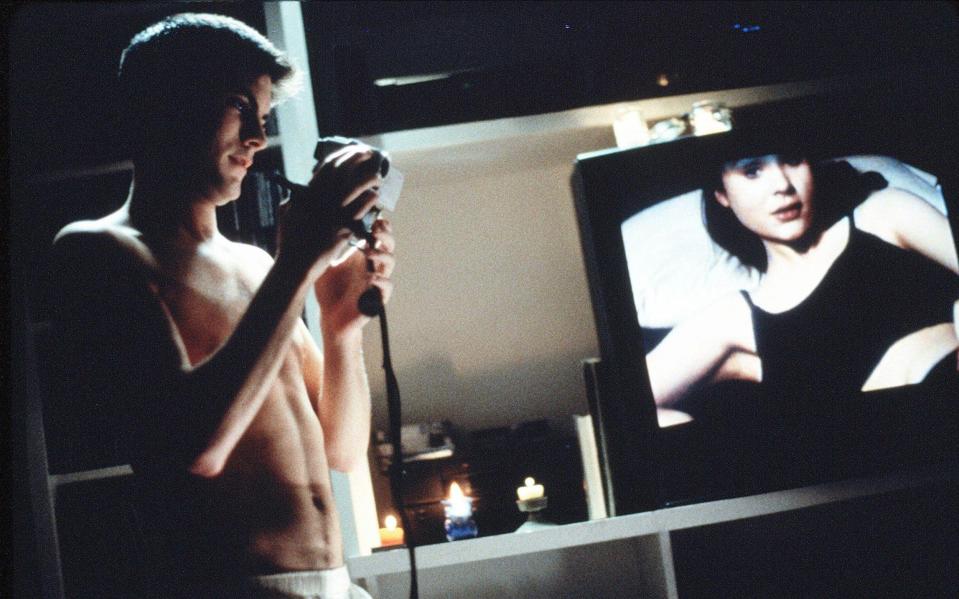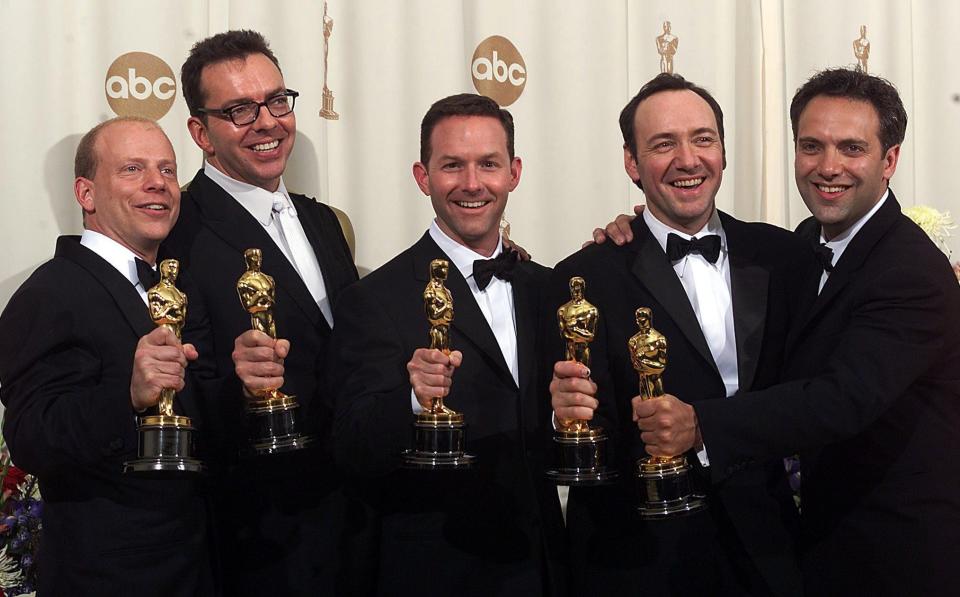Twenty-five years ago, during one of the best years in film history, a relatively low-budget character study hit American theaters. It had nothing like the hype of the year’s flashier films—Fight Club, The Matrix, The Phantom Menace, Eyes Wide Shut. – and was the work of first-time British director Sam Mendes, who had won accolades for his work in the theatre but had yet to prove himself on screen.
The film, written by former sitcom writer Alan Ball, stars Oscar-winning character actor Kevin Spacey in the lead role, along with respectable but commercially unimportant names such as Annette Bening, Chris Cooper and Allison Janney, and younger actors with early film acting chops such as Thora Birch, Mena Suvari and Wes Bentley.
The first sign that American Beauty, budgeted modestly at $15 million and distributed by Steven Spielberg’s Dreamworks Pictures, might be more than a tasteful examination of American suburbia came when it premiered to rapturous reviews at the Toronto Film Festival in September, followed by sold-out screenings in New York and Los Angeles before opening widely nationwide in early October.
It received critical acclaim — influential Los Angeles Times critic Kenneth Turan called it “a wonderful movie” — and made a fortune at the box office, grossing $356 million worldwide. It also swept the major Oscars in 2000, winning Best Picture, Best Director, Best Actor for Spacey, and Best Original Screenplay.
Among the films it beat in the awards race that year were M Night Shyamalan’s twisty ghost story The Sixth Sense, Frank Darabont’s prison epic The Green Mile and Michael Mann’s excellent The Insider. Many of the films remembered and revered over the past quarter-century – Magnolia, The Talented Mr Ripley, Being John Malkovich and Election, to name just a few – weren’t even nominated for Best Picture that year, even though they were. Instead, it was the smug, hermetically sealed smugness of Mendes and Ball’s film that most impressed Academy voters.
The Day-Glo version of Death of a Salesman had enough intellectual and aesthetic veneer to make it seem like a great and important film, with added sentimentality and exaggeration; yet beneath the surface, American Beauty had no more weight or depth than the plastic bag that Bentley’s drug-addicted sage Ricky Fitts was so proud to film in.
A quarter of a century later, American Beauty has become something of a joke. As Matthew Jacobs put it succinctly in the Huffington Post five years ago, “What was once a provocative masterstroke now looks like a farce in retrospect.” Like Roberto Benigni’s Life is Beautiful, which was hailed when it was released but is now seen as deeply misguided and shockingly overrated, Mendes’s film has faced the most brutal transformations when it comes to its public standing. Part of that, inevitably, stems from the recent history of its star, who may have won an Oscar twice but is now, after various vulgar allegations against him — and, lest we forget, various lawsuits in which he has not been convicted or held accountable for the charges against him.

But even before Spacey’s reputation took such a drastic dive, there were rumors that the film that earned him his second Academy Award was a startling example of the new mediocrity.
Comparisons have been made to Robert Redford’s homespun family drama Ordinary People, which won Best Picture over Raging Bull at the 1980 Oscars, and to Kevin Costner’s epic western Dances with Wolves in 1990, when it beat Goodfellas. Yet a decade later, American Beauty has beaten not one but a dozen deserving films. For example, South Park: Bigger, Longer and Uncut packs more wit, inventiveness and genuine shock value than the Oscar-winning film did in its entire 122-minute run.
Still, the Academy makes these kinds of worthless decisions more than once a decade, and many equally bad films are similarly rewarded. But what’s fascinating about the decline of American Beauty is that all of its once-praised aspects—Spacey’s performance, Ball’s script, Thomas Newman’s score, even that infernal plastic bag—now come to be seen as somewhere between problematic and inept, as one might expect from a film whose essence is a depiction of pedophilia that’s treated with both respect and affection.


Imagine Lolita being remade with the same indulgences offered to Hector in The History Boys – he may be a pederast but he is… ours a kind of pederast – and you’re approaching the dire gloom that Spacey’s Lester Burnham’s fascination with Suvari’s rose-covered nymphet has cast today. Burnham behaves in ways that would normally get his computers and mobile devices seized for close scrutiny by the police, because there’s something hideous hidden on hard drives and WhatsApp groups.
In the context of an oddly forgiving film, Lester’s unseemly obsession is yet another manifestation of the fundamentally false belief at its core: There’s so much beauty to be found in the world, often in unexpected places, that you might miss it if you didn’t look around every now and then.
This has all the depth and originality of an American Express advertising slogan—if, for some reason, American Express decided to associate itself with sex offenders. It’s shocking to remember that at the time, all of this was considered generally acceptable. MTV, to the studio’s dismay, nominated a particularly grim scene between Spacey and Suvari for Best Kiss. They had a history of this.


Last year, a similar moment between Jeremy Irons and Dominique Swain in Adrian Lyne’s version of Lolita — sexual harassment as a perfume ad — was also singled out for such recognition. As allegations against Spacey mounted in 2021, Suvari said she felt “weird and unusual vibrations” from Spacey on set. To prepare for an intimate scene together, Spacey asked them to “lay down on a bed very close to each other.” She recalled: “He was holding me gently. It was very peaceful, but it was strange and unusual.”
Still, times and traditions change, and perhaps it’s unfair to attack American Beauty for what happened next, both in society and in Spacey’s career. Speaking about how “Kevin” was able to thwart the potential 20th anniversary celebrations, Thora Birch said: “It hurts. It’s traumatic. The allegations [against him] “The movie has nothing to do with it.”
Better, then, to take aim at his arrogant incompetence. The writing is weak throughout, vacillating between fortune-cookie cliches and pseudo-obnoxious displays of levity, and, perhaps most surprisingly given Mendes’s immense talents as a theater (and later, movie) director, the performances, Spacey aside, are largely dreary. Bening starts in theatrical camp and goes up or down from there, and Peter Gallagher, as her oily real-estate lover Buddy, offers a lesser reprise of Charlie Higson’s sublime work in The Fast Show as the would-be Lothario car salesman Swiss Toni. Suvari and Birch look startled, or maybe they are; Bentley just looks bored, less a poet of mystery than a creepy-cam guy to be avoided at all costs.
Meanwhile, Cooper doesn’t get to do much with Frank, the most one-dimensional of characters, the undercover soldier who eventually becomes the killer. I’m still not sure whether Mendes and Ball realize that the central visual gag that propels the climax — Frank spots Lester and his son Ricky smoking a joint together, but from the angle he’s watching it looks like Ricky is performing oral sex on Lester — is lifted from a similar scene in Carry On Camping , which shows Terry Scott and Betty Marsden doing unspeakable things in silhouette in their tent.
Coincidentally, the same joke had been used earlier that year in the Austin Powers sequel The Spy Who Shagged Me, which showed that a joke about a woman pulling increasingly incredible things out of her husband’s behind had a remarkably premillennial impact.


It didn’t take long for American Beauty to garner backlash. It was repeatedly parodied on Family Guy in 2001, when hapless patriarch Peter Griffin, watching a plastic bag flap aimlessly in the wind, deliberately echoed the film by saying, “There’s so much beauty in the world, it makes my heart burst.” At the time of American Beauty’s release, Bill Clinton called the film “incredible,” a nod; three years later, with Clinton’s reputation tarnished, late-night TV host Jay Leno said, “A president as distinguished as Bill Clinton… [whose] “My favorite movie is about a man stuck in a loveless marriage and obsessed with having sex with a young girl.”
The film has been repeatedly criticized and slammed as empty, tasteless and fundamentally rotten, a self-satisfied sitcom script overwrought with exaggerated depth.
In fact, American Beauty is now so loathed that a backlash has developed as its defenders step forward to champion the cause. Last year, critic Geoffrey MacNab wrote in the Independent , amid the Spacey scandal, that the film remains “a compelling portrait of suburban malaise and despair.” He continued: “It’s gorgeously shot by veteran cinematographer Conrad Hall, features a number of outstanding performances from the ensemble cast, and ventures into dark, dangerous territory that contemporary filmmakers won’t approach.”


And then there will be others who will argue that he is now so ridiculed and in danger of being under-appreciated that many still admire him. He is currently rated 77pearl Best movie of all time on IMDB between the original Oldboy and Avengers: Endgame.
It’s unfortunate that its strongest individual element – Spacey’s still excellent performance, conveying frustration, anger and sadness with only the slightest facial expressions – was so devalued by the lead actor’s cancellation, but at least Hall’s cinematography is excellent and deserves its Oscar. It’s a shame that its companion film remains a classic example of the emperor’s new clothes, growing more unimpressive and shrill with each passing year.
Beauty can indeed be found in the most unlikely places, but just as the central visual motif of the abandoned plastic bag strikes us today as trivial and trivial, a film that once filled middle-class dinner parties and book societies on both sides of the Atlantic with its praise now seems both ephemeral and tasteless.
“Look closer,” the film’s tagline urged viewers. So they did. A quarter of a century later, many strongly dislike what this review revealed. It’s unlikely to be remade anytime soon.